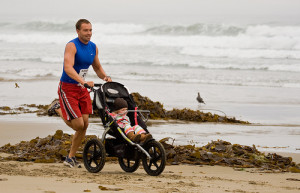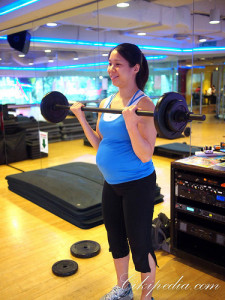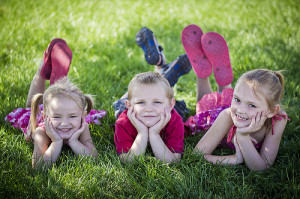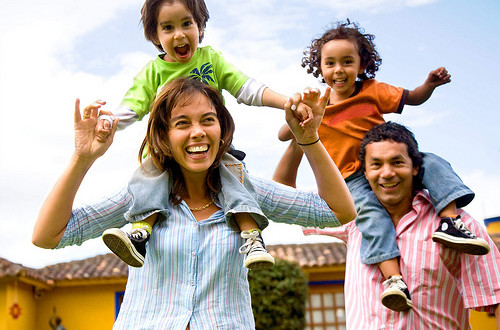by Michelle Sutton-Kerchner
Countless colds, sleepless nights, and yet another injury may not sound like a healthier lifestyle. Yet, children often boost the health of moms and dads everywhere …
Choosing a life with children is an extremely personal, lasting decision. The childless tend to have more freedom. With that independence, time and money can be dedicated to whimsical vacations, spontaneous plans, and a variety of life’s opportunities– all with the stamina afforded to those who can sleep uninterrupted on a regular basis. Accomplishing a workout and overall healthy lifestyle might not be an Olympic feat in itself.
Yet, statistics prove if you opt for the adventure of parenting, there are healthful benefits. You may have to dig a little deeper in life’s box of tissues to discover them, but they exist. With cold and flu season approaching, now is a good time for the many, the brave to see the sunshine through the boo-boos.
Life Depends on You
Kids tend to be the ultimate motivator for a healthier lifestyle. Those considering conception often take steps toward improved health by eating well, quitting cigarettes, and eliminating caffeinated and alcoholic drinks. Couples who embark on the parenthood journey tend to take a team approach to improve their physical condition.

Although men do not bear the physical responsibility of pregnancy, studies prove fatherhood inspires the tightening of one’s belt– and not just financially. The birth, and pending birth, of a child is a large motivator for guys to get in better physical shape. It triggers an instinct (survival?).
Along with thoughts of saving for everything from the latest baby gear to college tuition, parents want to be around to see their families grow and prosper. Many Center members credit their children as motivation to improve their health.

It is not only the pregnant parent who requires a body in optimum shape. The dream of playing and growing with children well into old age, and providing for them, has shed countless unwanted pounds, reduced cholesterol, lowered blood pressure, and strengthened joints and muscles. (Piggyback rides cannot be your downfall.) Perhaps this is one reason parents have a lower rate of heart disease and suicide.
Along with the desire to improve health, traveling through life with children provides unique opportunities. When permitted, we can learn from younger generations. As adults, we often charge through life desensitized to our surrounding world. Linked with a child, we can let ourselves rediscover the value of a caterpillar, the beauty of a fallen leaf, and a curiosity that makes even the everyday seem a wonder. (Agreed, it may be while rushing to an appointment, but when else!) Parents are afforded opportunities to counteract the world’s heaviness and focus on hope provided by the future generation.
Thriving on Routine
Kids love a routine. Predictable schedules and activities create a sense of comfort and security. As nature would have it, adults thrive on routine as well. (A surprise night out doesn’t count.) From birth, parents need to sharpen organizational skills to manage the schedule of an additional person, and that person’s appointments and events may at times rival those of a CEO.
Along with the need to schedule in everything, even a chat with your spouse, comes the secret to committing to exercise. Whether a fitness newbie or veteran, parents recognize if a workout is not on the calendar, it will not happen. Workouts scheduled like other activities have a proven record of getting accomplished. If it is on mom’s agenda, like everything else, it is going to get done. You don’t need to be a parent to schedule workouts on your calendar. Do it, and see the difference!
Brain Power
The traditional “mommy brain” myth associated with a new mom’s supposed absent-minded behavior is officially debunked. Research has proven an increase in the brain size of post-partum mothers. A study published in Behavioral Neuroscience examined brain scans of women at two to four months after birth. Their mid-brain and prefrontal cortex regions showed growth, which respectively involve the experience of pleasure and ability to reason, plan, and make judgments.
Although the scans could only indicate brain size, this often correlates to intelligence. Researchers believe it is a strong indication that these women got smarter during new motherhood. This study did not involve new fathers. However, the concept is likely the same. The child’s brain is nurtured and developed from a mother’s input, who in turn experiences her own brain growth. The same can apply to a new father in that role. There is also the plethora of facts and advice, wanted and unwanted, thrown at new parents. Knowledge overload!
A parent’s ability to increase brain power goes beyond babyhood. The act of playing– which should continue throughout life, but is more likely with kids in tow– has a positive impact on cognitive abilities. Play stimulates nerve growth in the portion of the brain that processes emotion and executive function. It fuels creativity and builds problem-solving skills.
Let’s not forget the social and intellectual growth thrust upon parents of older children as they forge through play dates, pop culture, and advanced geometry. An expanded social circle, and increased social interaction, is known to have a positive impact on health. Although a parent may long for a moment alone, there is never a shortage of socializing when kids are in your life. Plus, a parent’s workout playlist might even contain a few songs from this decade, although the health relevance there is debatable.
How to Avoid Petri-Dish Syndrome

To realize the ways children may positively impact their parents’ health, one must look beyond the obvious. With children, household colds increase exponentially (quoted by an actual pediatrician, not only parents congested with the tenth cold of the year). Strange viruses become commonplace. Bones break as a result of crazy mishaps. Here, those without young ones are usually healthier than their cute-but-germ-toting counterparts.
Surprisingly though, when children get sick, parents do not always contract the illness. One study, which followed almost 800 adults, proved parents were less likely to develop a new cold virus than their childless peers. It did not indicate parents contracted less colds than non-parents; rather, parents were less likely to catch a new cold virus when exposed.
The more kids, the stronger immunity: Parents with one or two children were 48 percent less likely to get sick than non-parents. Parents with three or more children jumped to 61 percent less likely. The finding held true for parents with adult children who no longer lived in the same household.
Researchers attribute this resistance to stronger social support systems and increased immunity via exposure to pathogens through their children. Psychological factors, such as decreased loneliness and increased sense of purpose, may also be responsible.
Keep those stats true to fact. When caring for someone who is ill, these habits can help you remain healthy:
- Wash hands frequently and properly. Lather and rinse for at least 30 seconds.
- Use disposable paper towels for bathrooms and kitchen rather than sharing cloth ones.
- Wipe down regularly handled objects (remote controls, phones, door handles, knobs, sinks) with disinfectant throughout the day and before bed.
- Snuggle smartly. Children love to be held when sick. Sit them on your lap facing away from you to watch a movie or read a book. This allows cuddle time without sneezing, coughing, and breathing on each other’s faces.
- Immediately dispose of used tissues.
- Keep hand sanitizer nearby for quick cleaning.
- Try to manage plenty of rest and liquids for yourself, as well as your “patient.”
 A detailed study published in Psychological Science linked maternal love to better outcomes for children raised in poverty. Maternal warmth and nurturing protected participating children against the negative impact of poverty on health. This included a decreased risk of metabolic syndrome (the setup for several long-term chronic illnesses). Alternately, sheer determination to share a long, joyous life with one’s children conquers many a health issue.
A detailed study published in Psychological Science linked maternal love to better outcomes for children raised in poverty. Maternal warmth and nurturing protected participating children against the negative impact of poverty on health. This included a decreased risk of metabolic syndrome (the setup for several long-term chronic illnesses). Alternately, sheer determination to share a long, joyous life with one’s children conquers many a health issue.
For the parent, keep calm and carry on. With every sniffle and sneeze, this too shall pass. You will emerge stronger, and perhaps healthier, because of it. For the non-parent, recognize the joy you bring into this world by living a life that is true to your heart. That is how we all thrive.
Sources
“5 Ways Your Kids Make You Healthier,” at www.shine.yahoo.com.
“10 Reasons Play Can Make You Healthy, Happy, and More Productive,” by Nancy Shute at www.usnews.com.
“How a Mother’s Love May Counter the Negative Health Effects of Poverty,” by Maia Szalavitz at www.time.com.
“Parents Are Better Able to Fight Off Cold Viruses, Study Finds, by Susan Perry at www.minnpost.com.
“The ‘Mommy Brain’ Is Bigger: How Love Grows a New Mother’s Brain,” by Maia Szalavitz.
Image Credits
Happy, healthy family (introductory photo): www.flickr.com/photos/100642687@N03/9787078802/
Jogging dad: www.flickr.com/photos/mikebaird/2913345328/
Training pregnant: www.flickr.com/photos/cumidanciki/7807499954/
Happy, healthy children: www.flickr.com/photos/enduringessence/7382554544/
Parent’s love: www.flickr.com/photos/freeflight046/3608676911/
 Fitness & Wellness News Your Source for Fitness News, Wellness News, Health News, and Nutrition News!
Fitness & Wellness News Your Source for Fitness News, Wellness News, Health News, and Nutrition News!




